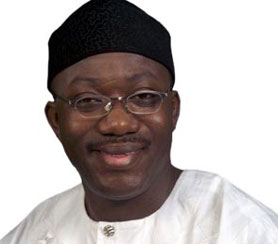 The most memorable moments of life’s varied encounters sometimes come without a force or fanfare. But as events unfold years later, we come to recognise their landmark nature and what truly defined them. Such was my first chanced meeting with the former governor of Lagos State, the icon of democracy, Asiwaju Bola Ahmed Tinubu in 1993. It remains an unforgettable scenario which was replicated later with the current, highly resourceful governor of Ekiti State, Dr. John Kayode Fayemi.
The most memorable moments of life’s varied encounters sometimes come without a force or fanfare. But as events unfold years later, we come to recognise their landmark nature and what truly defined them. Such was my first chanced meeting with the former governor of Lagos State, the icon of democracy, Asiwaju Bola Ahmed Tinubu in 1993. It remains an unforgettable scenario which was replicated later with the current, highly resourceful governor of Ekiti State, Dr. John Kayode Fayemi.
One can still vividly recall that I was just settling down at The Guardian Newspaper. It was during one of the most turbulent periods of the nation’s chequered political history with the crude and callous annulment of the June 12 presidential election, adjudged to have been freely and fairly won by late Chief M.K.O Abiola.
It was on my assignment to cover the post-election crisis that trailed the aforementioned annulment by the famed military president, General Ibrahim Badamosi Babangida, IBB when I first encountered the Asiwaju, one of the pillars of the struggle to actualize that mandate. Back then however, his compelling political pedigree and persona were yet to unfold like the colourful flower’s petals to the sun’s glorious rays before he slipped into exile, to the United States during the Abacha regime‘s dreaded military dictatorship.
Still, he was elected and sworn in as the governor of Lagos state in 1999. I elected to watch his government from a distance. That was, until the charm of his then Chief Press Secretary, Mr. Segun Ayobolu drew the attention of notable journalists to his government. Coincidentally, media missiles were then flying all over the political sphere; mostly to ascertain what form and shape his government would take as the take-off itself was up against the clouds precisely in the first six months. But it was not long before he exhibited a master stroke with the whirlwind of a media tour.
On that momentous occasion, he looked relaxed with a wan smile playing around his lips as he gave details of his master plan to institute enduring structures in Lagos state. Good enough for his administration some six months later his promises had started bearing fruits. What with massive infrastructural development in the critical areas of road construction, education, primary healthcare delivery and the transport sector. With them came free eye screening project, LASTMA and LAMATA just to name a few. The rest, as they say, is history.
Incidentally, a similar scenario was about playing itself out in my encounter with the current governor of Ekiti State, JKF. First, was the opportunity for me to gain from his fecund mind as one enjoyed reading his thematically relevant and thought-provoking essays in the African Guardian where he worked briefly. That was before one’s professional ship of journalism safely berthed there. Subsequently, I got more acquainted with him when he became a major fighter in the pro-democracy group. That was during the desperate struggle to find answers and validate the June 12, 1993 election impasse.
Worthy of note was the fact that he was the brain behind the immensely popular Radio Kudirat that sent shivers down the spine of late General Abacha’s military monstrosity. All because of the implicit trust the western world reposed in him, JKF became the dependable link between it and the pro-democracy activists. It is on record that twice he was offered huge sums of money in hard currency, surreptitiously to play the Judas and thwart the collective will of Nigerians and twice he rejected the lure of the lucre which he considered evil.
On this score, I had no hesitation in throwing my weight behind him when he took the bold decision to throw his hat into the gubernatorial ring of his state. But in a similar vein to the encounter with the Asiwaju, I waited patiently for two years to critically assess the political situation in Ekiti State if he would match words with action. Specifically, in line with the promises he had made during the electioneering campaign and the well articulated Eight-point Agenda.
Three years on, JKF has indeed, walked the talk In a paradigm shift from the average Nigerian politician angling for power only for self-aggrandizement he has directed the tool of governance to be more people-oriented.
From massive infrastructural development through truly free education and human capacity development policy to modernizing agriculture, health care services, industrial development to opening up the beautiful tourist attractions for the entire world to see and gender equality, JKF has become the agent of change.
This article was first published in Vanguard
Last modified: December 10, 2013
